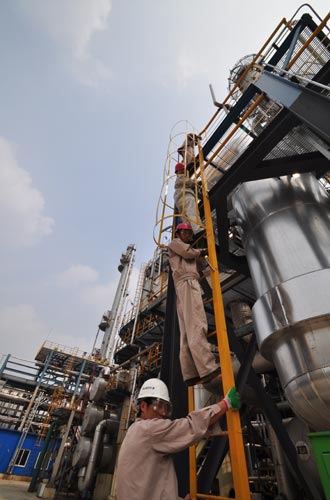|
 |
|
The catalytic pyrolysis process equipment built at Shenyang Chemical Co Ltd. Using CPP equipment, the company has built up an industry chain from upstream raw material supplies to downstream sales of petrochemical products. [Photo/China Daily] |
Bold restructuring turns ailing Shenyang firm into industry giant
Wang Dazhuang turned around a waning State-owned petrochemical company that had been stagnant for more than a decade when he took the helm in 2002, but in doing so he took a very big risk.
Had he not succeeded, about 20,000 employees would have lost their jobs, alongside tens of thousands of manufacturing workers in the city of Shenyang.
"I was under immense pressure with the future of a badly performing company in my hands," Wang recalled. The then 40-year-old was general manager of Shenyang Chemical Group Co, a behemoth, like many of its State-owned peers, with 10 subsidiaries and hundreds of products. But despite its complicated structure and huge size, the company's annual profit was less than 10,000 yuan ($1,587).
After taking office, Wang started taking measures to restructure the company's product portfolio by axing most of the unprofitable lines and updating the old-fashioned manufacturing equipment to cut costs.
To achieve his ambitions to revive Shenyang Chemical, he had to scramble to raise cash to close a huge funding shortfall. Wang recalled that in the first several years, funding was an issue that he had to confront almost every day in managing a cash-strapped company in a capital-intensive industry.
Around 6.2 billion yuan has been invested in the company since 2003 to upgrade technology and products. The investment was hefty compared with the 2 billion yuan asset size of the company.
"I racked my brains over financing and visited one bank after another," Wang recalled. The issue became particularly critical when he decided in 2007 to build the world's first ever catalytic pyrolysis process equipment by adopting a novel technology to convert heavy hydrocarbons into ethylene and propylene.
CPP was the project Wang selected from among dozens, even though it proved to be the most difficult one.
CPP is a technology developed by Wang Xieqing and his team, from the Chinese Academy of Engineering. They acquired patents both at home and abroad. The state-of-the-art science, however, had never before been developed for commercial operations because of the complicated technology and high risks when Wang decided to embark on the project.
Given that in theory it would solve the problem of the shortage of raw materials that most chemical companies face and would turn a cheaper residual oil into ethylene, Wang decided it was worth a try.
China consumed 31.3 million metric tons of ethylene last year. More than half of it was imported. "The supply deficit is huge and will not easily be met anytime soon in China," said Li Chen, deputy chief engineer of China National Petroleum and Chemical Institute.
In a country that is heavily reliant on crude oil and ethylene, CPP is an efficient tool enabling the country to cope with a shortage of natural resources, Li said. "It was a wise move."
But back in 2004 it was a hard decision. Wang admitted he had never experienced heavier pressure than when he set about establishing the revolutionary CPP project, which cost the company 3 billion yuan.
To meet the funding shortfall, he visited all the banks in the city. Most turned him down. Finally, a small local bank lent him 1.3 billion yuan to quench the company's cash thirst.
